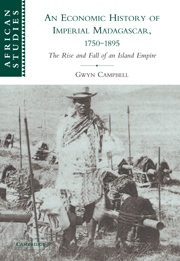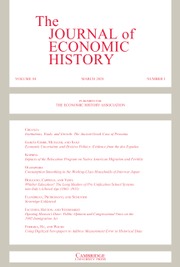An Economic History of Imperial Madagascar, 1750–1895
The Rise and Fall of an Island Empire
£39.99
Part of African Studies
- Author: Gwyn Campbell, McGill University, Montréal
- Date Published: December 2008
- availability: Available
- format: Paperback
- isbn: 9780521103916
£
39.99
Paperback
Other available formats:
Hardback
Looking for an inspection copy?
This title is not currently available on inspection
-
The first comprehensive economic history of pre-colonial Madagascar, this study examines the island's role from 1750 to 1895 in the context of a burgeoning international economy and the rise of modern European imperialism. Challenging conventional portrayals of nineteenth-century Madagascar as a unified and progressive kingdom, this study reveals that the Merina of the central highlands attempted to found an island empire and through the exploitation of its human and natural resources build the economic and military might to challenge British and French pretensions in the region. Ultimately, the Merina failed due to imperial forced labour policies and natural disasters, the nefarious consequences of which (disease, depopulation, ethnic enmity) have in traditional histories been imputed to external capitalist and French colonial policies. Although by 1890, Madagascar was firmly integrated into a regional trade network stretching from South Africa to India, dominated by British Indians, Britain acknowledged French claims to Madagascar. France took 13 years to conquer Madagascar, finally succeeding only due to the internal collapse of Merina power.
Customer reviews
Not yet reviewed
Be the first to review
Review was not posted due to profanity
×Product details
- Date Published: December 2008
- format: Paperback
- isbn: 9780521103916
- length: 436 pages
- dimensions: 229 x 152 x 25 mm
- weight: 0.64kg
- contains: 37 b/w illus. 10 maps 38 tables
- availability: Available
Table of Contents
Introduction
1. The traditional economy, 1750–1820: industry and agriculture
2. The traditional economy, 1750–1820: commerce
3. Empire and the adoption of autarky, 1810–26
4. Industry and agriculture, 1820–95
5. Labour, 1820–95
6. Population, 1820–95
7. The trading structure, 1820–95
8. Foreign trade, 1820–95
9. The slave trade, 1820–95
10. Transport and communications, 1820–95
11. Currency and finance, 1820–95
12. Madagascar in the scramble for Indian Ocean Africa
Epilogue. The rise and fall of imperial Madagascar
Appendices
Bibliography
Glossary
Index.
Sorry, this resource is locked
Please register or sign in to request access. If you are having problems accessing these resources please email [email protected]
Register Sign in» Proceed
You are now leaving the Cambridge University Press website. Your eBook purchase and download will be completed by our partner www.ebooks.com. Please see the permission section of the www.ebooks.com catalogue page for details of the print & copy limits on our eBooks.
Continue ×Are you sure you want to delete your account?
This cannot be undone.
Thank you for your feedback which will help us improve our service.
If you requested a response, we will make sure to get back to you shortly.
×



















